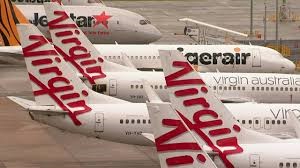Those of us involved in importing and exporting are sitting up to take notice of two news stories in particular over the past 24 hours: Virgin Australia placing itself into voluntary administration, and the drop of oil prices to the lowest point in history.
Freight and logistics, aircraft maintenance and repair, flight training and simulation, component manufacturing and research and design operations are all bundled together into a tightly bound sector. All up, five subsectors of this industry – domestic commercial aviation, international commercial aviation, general aviation, freight transport and aviation support infrastructure – have provided employment for about 90,000 Australians across 1,900 businesses.
If Virgin’s administrators can work out a deal that injects new investments and wipes its debts, Australia’s airline industry could conceivably emerge from the other side of the coronavirus crisis more competitive than it is now. When we reach that point, fuel costs, which accounted for about 24% of the global airline industry’s operating costs in 2019, are likely to be lower. The oil price is at its lowest level in history – so low, in fact, oil producers are now paying customers to take it.
Virgin Australia Cargo has been an important part of the company, providing services for major shippers and logistics operators, with access to cargo handling terminals in all major airports across Australia. Domestic connections can be a vital link in the international network, especially here in Queensland where producers and exporters need to get their goods to Brisbane or Cairns to make timely connections.
Prior to the outbreak of the Covid-19 pandemic, Virgin boasted more than 3,400 flights per week through its network of 47 domestic and 16 international destinations. They operated a fleet of around 150 aircraft, including Airbus A330, Airbus A320, Boeing 777, Boeing 737, ATR-72 and Fokker 100.
It is encouraging to note that three big airlines based in the US have survived near-death experiences: Delta filed for Chapter 11 bankruptcy in 2005, United in 2002, and American Airlines in 2011. All were restructured and emerged from the process as more efficient operations. They are now the world’s first, second and fourth-biggest airlines by passenger capacity. History is also a factor. The global aviation industry is no stranger to “system shocksâ€. These have included the Global Financial Crisis of 2008, the SARS outbreak in 2003, the World Trade Centre attacks in 2001, the Asian Financial Crisis in 1997 and the oil shocks of the 1970s.
The impacts of Covid-19 were apparent in the figures just released by the Australian Bureau of Statistics: the country’s trade surplus dropped 8.8% in February; exports were down 4.7% while imports dropped 4.3%, or A$1.5 billion. It is important that we keep planes in the air, laden with cargo, if not passengers.
In the interests of avoiding a monopoly in Australia’s domestic airline industry, and for the sake of Virgin’s employees and the jobs of thousands more that depend on it indirectly, we hope the company survives. Whether or not that is in the form of a major shareholding by Chinese investors remains to be seen.
Colless Young will continue to issue regular updates on the effects on international trade and shipping as a result of COVID-19. As licensed Customs Brokers and International Freight Forwarders, we offer you correct, professional advice on all your import and export shipping needs. We handle cargo at all major ports and airports around Australia.

